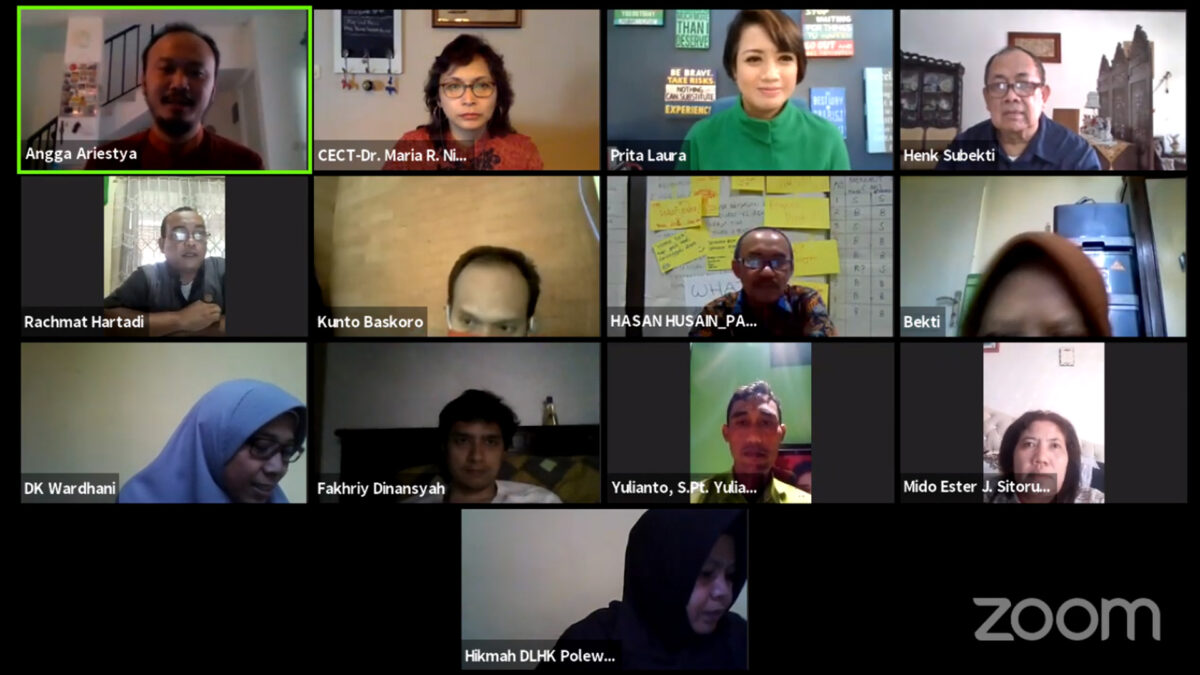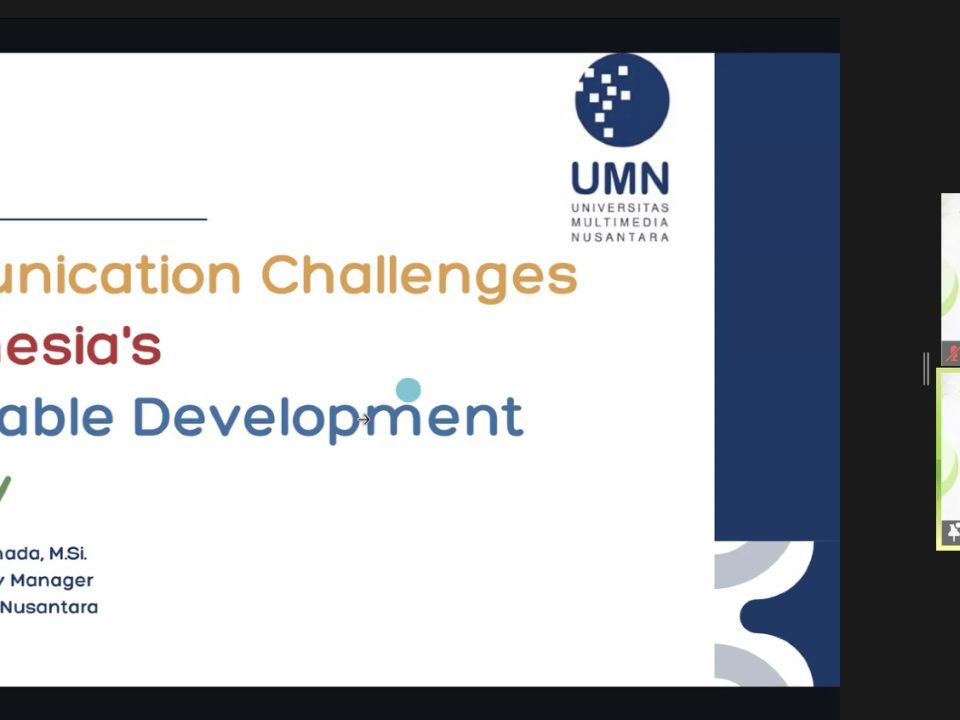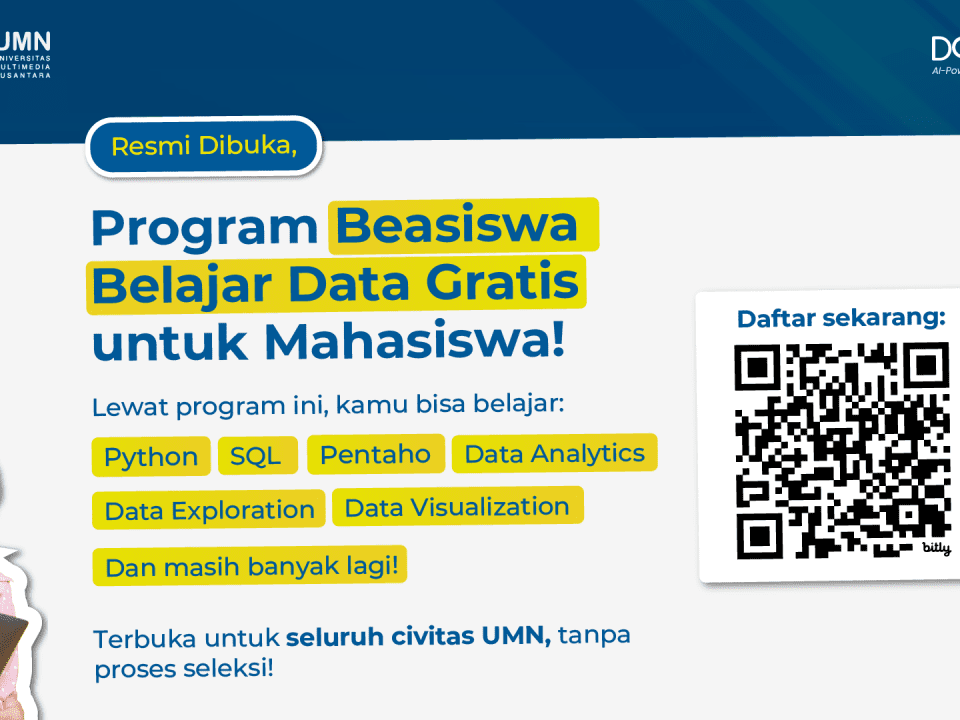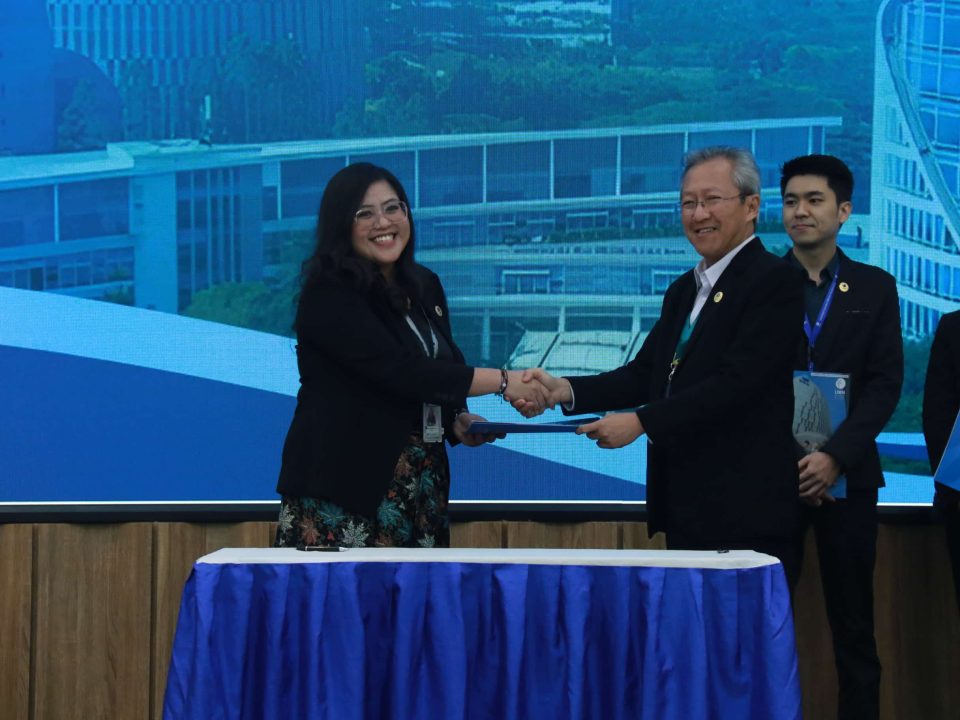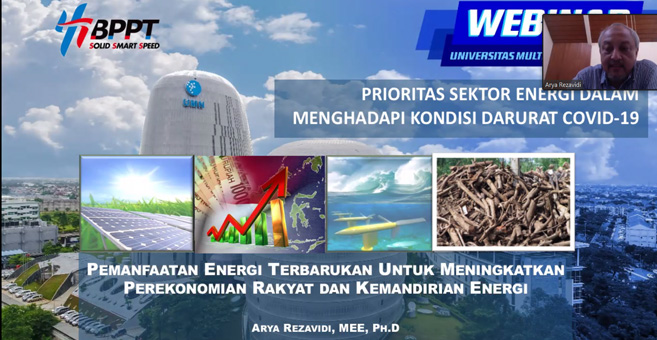
UMN FTI Webinar: The Importance of Energy Utilization and Savings in the Midst of COVID-19
May 11, 2020
Webinar UMN: Potensi Sampah Makanan untuk Energi Terbarukan
July 3, 2020
Webinar “Food Waste Not Wasted: The Potential of Food Waste for Renewable Energy” (doc. UMN)
TANGERANG – Multimedia Nusantara University in collaboration with Rumah Energi held a Webinar entitled “Food Waste Not Wasted: Potential of Food Waste for Renewable Energy” on Tuesday, June 23, 2020.
The webinar “Food Waste Not Wasted” moderated by Prita Laura as a Journalist and Environmental Activist presented speakers from various backgrounds and was attended by more than 150 participants from various circles. Speakers were present including: Agung Lenggana as Project Manager of Rumah Energi Foundation; Maria R Nindita Radyati Ph.D as Vice Chairman of Coorporate Social Responsible (CSR) at KADIN Indonesia; DK Whardani as Author of Books Towards a Minimal Waste House; and Angga Ariesta, M.Si as Fikom UMN Environmental Communication Researcher.
The session opened with a speech from Ir. Andrey Andoko M.Sc as vice chancellor of Multimedia Nusantara University (UMN). His remarks mentioned that Multimedia Nusantara University has always supported energy saving efforts. “This is evidenced by UMN established an environmentally friendly building that won the first place in the ASEAN Energy Award 2014,” said Andrey.
This webinar discusses the real efforts that communities, communities, and the private sector can make to process household waste into renewable energy. This topic also responds to the results of research by the Central Statistics Agency (BPS) which predicts that by 2025 the amount of garbage deposits that accumulate in urban Indonesia will continue to grow to reach 1.42 kg per person per day or 2.2 billion tons of waste per year.
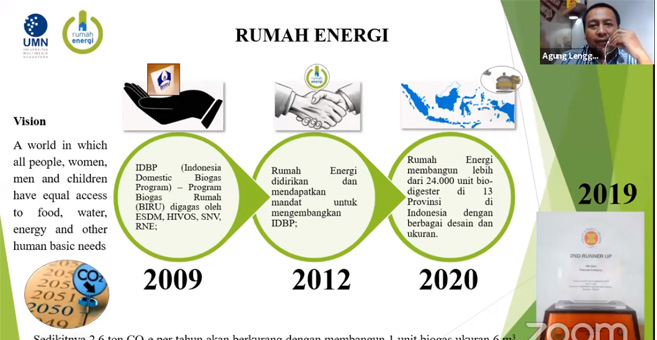
Agung Lenggana as Project Manager of Rumah Energi Foundation (doc. UMN)
Agung Lenggono continued by providing an explanation of the efforts of the Rumah Energi Foundation which he represented in collaboration with the Blue Program (Biogas Rumahan). Rumah Energi is a leading national institution working actively in the development and dissemination of the use of modern and environmentally friendly forms of renewable energy. Biru program is a development of idbp (Indonesian Domestic Biogas Program) program initiated since 2009 by ESDM, SNV, HIVOS and RNE. This program is a real effort with the goal of equal access to renewable energy, access to food, and access to water as daily needs.
This program is carried out to process household waste into biogas energy. Biogas is a gas produced from anaerobic activity and fermentation of organic matter. “Processed biogas energy leftover animal waste and household waste can be used for cooking gas needs, biogas lamp lighting, a mixture of animal feed and plant fertilizers,” agung said.
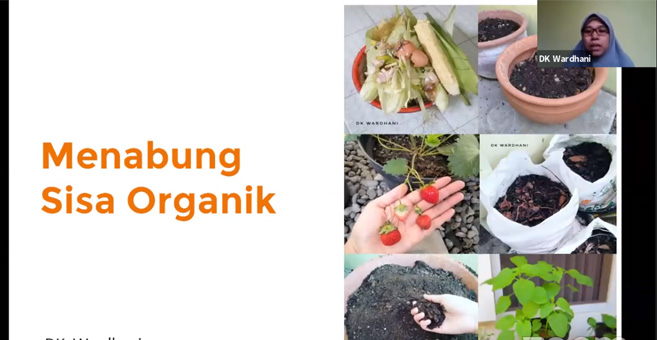
DK Whardani as the Author of The Book Towards The Garbage House (dock. UMN)
In addition to the program from Rumah Energi, DK Whardhani – who is often called Dini – as the Author of the Book “Towards a Minimal Waste House” also provides a debriefing of household habits to process the rest of household products into renewable energy. This habit must begin with changing the mindset of the individual and society. Dini told how he campaigned for the rest of the household results starting from himself. “I started to change my perception of household waste from the mention. Now I call the rest of the organic consumption because the rest of the consumption can be processed. We have to start with small habits to process the rest of organic consumption,” said Dini who is a Lecturer in Regional and City Planning, Universitas Brawijaya.
The small habits that Dini apply are 3-AH efforts, namely Prevent, Pilah and Olah. Prevent residual consumption by not throwing away food and limiting food use, sorting waste into organic and inorganic waste, and processing by composting in various media. He revealed that making compost is quite easy, the obstacle is only on individuals with various reasons of perception and laziness.
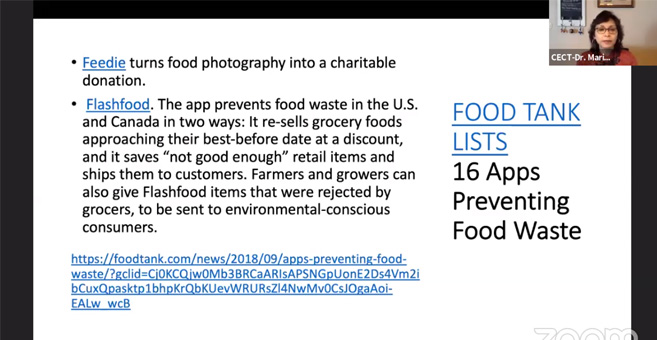
Maria R Nindita Radyati Ph.D as Vice Chairman of CSR at KADIN Indonesia (doc. UMN)
In addition to individuals and households who start a business to process waste leftover households; Private and community companies also have an important role to play in this effort. Maria R Nindita Radyati as Vice Chairman of Coorporate Social Responsible (CSR) at KADIN Indonesia gave an exposure on how to solve problems in the Sustainable Development Goals (SDGs) that focus on Food Waste (leftover food consumption).
“Here companies, communities and individuals have to work together to solve those problems. There are several efforts that can be done to reduce food waste, namely by not leaving food and donating food to others, “said Maria. He also explained the programs of various private companies that have conducted Foodbank of Indonesia which is engaged by donating food. At the end of the opportunity, Maria said that companies with the community and the community have a big hand to campaign for the processing of waste into renewable energy.
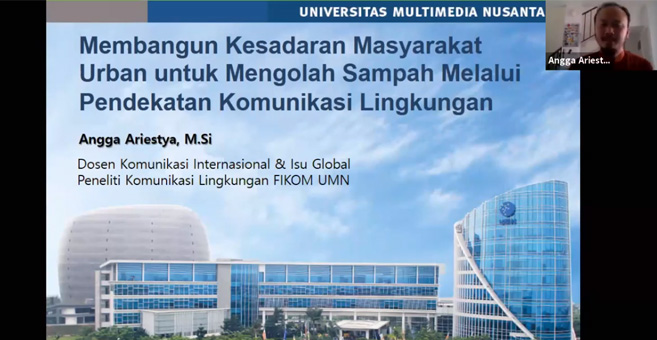
Angga Ariesta, M.Si as Fikom UMN Environmental Communication Researcher (doc. UMN)
Building awareness of urban communities to process waste can be done with environmental communication. This was conveyed by Angga Ariestya as Lecturer and Researcher of FIKOM Multimedia Nusantara University. Angga said that awareness of processing waste in the community is still low, evident from the KIC survey in 2019 that only 49.20% of 354 respondents had awareness to process waste.
“The problem of processing waste can be handled externally with policies, institutions, informants, innovation and technology. However, internal problems or changing individual mindsets require different handling. Here the environmental communication approach helps humans understand environmental problems and relationships with nature,” said Angga. Environmental communication approaches should be supported by public awareness of a value that produces habits in behavior.
The webinar which was broadcast live on the Youtube account of Multimedia Nusantara University was closed with a question and answer session from participants. At the end of the Webinar, Prita Laura challenged the speakers to invite the public to implement the habit of processing waste into renewable energy. “I believe ‘from the ground back to the ground’. One of the ways we return the rest of our consumption to the ground to nourish the earth so that the food chain continues to run and produce sustainable living,” said DK Whardani closed the session with a sweet invitation. (ABA/SN)
*by Adonia Bernike Anaya – Universitas Multimedia Nusantara News Service
Kuliah di Jakarta untuk jurusan program studi Informatika| Sistem Informasi | Teknik Komputer | Teknik Elektro | Teknik Fisika | Akuntansi | Manajemen| Komunikasi Strategis | Jurnalistik | Desain Komunikasi Visual | Film dan Animasi | Arsitektur | D3 Perhotelan | International Program, di Universitas Multimedia Nusantara. www.umn.ac.id

